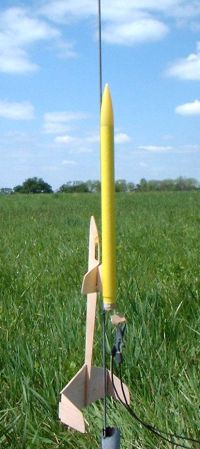| Construction Rating: | starstarstarstarstar_border |
| Flight Rating: | starstarstarstar_borderstar_border |
| Overall Rating: | starstarstarstarstar_border |
| Manufacturer: | Quest  |

Brief:
If you're just getting started on boost gliders (especially pursuing NARTREK),
this quick and easy kit is a good introduction. It can be built in under an
hour and eliminates some of the more complex glider construction techniques
like airfoiling and decollage.
Construction:
Parts were good quality and include:
- TT-20 body tube
- BT-20 motor tube
- Plastic nose cone
- Laser-cut balsa glider parts
- Balsa fuselage
- Kevlar®/elastic shock cord
- Plastic streamer
Quest rates this a skill level 2 kit although I would think that's a bit high. It's a very easy build and the directions are pretty straightforward.
You begin with a standard motor mount assembly, consisting of an 18mm tube, a block, and a metal clip. The Kevlar® shock cord is anchored to the motor block a bit close to the ejection charges, but it should hold up for at least as many flights as it takes you to lose the glider, which in Bill Eichelberger's case would be one.
The motor assembly glues directly into the TT-20 tube as no centering rings are needed, but you need to make sure you leave yourself about 3/8" hanging back or you won't be able to work the clip. Next, you glue the pod pylon and launch lug to the pod tube. Considering the colored glassine finish on the tube, it's a good idea to scrape off a little strip to provide a good bonding surface. Slip the shock cord through the body tube, slip on the streamer and tie on the nose cone. The pod is done.
As Bill pointed out in his review, the glider assembly is very simple thanks to the laser cut parts. I found my fit a bit loose though as the notched cutouts were a bit larger than necessary. Like most Edmonds gliders, this is designed to fly well without airfoils or even rounding of leading or trailing edges. I sanded off the burnt brown edges from the laser but otherwise had plain flat edges to all my edges. I sanded down the exposed surfaces with 400 grit sandpaper as the balsa was a bit rough.
There are very basic instructions for hand tossing and trimming the glider. I would really like to have seen a target position for CG on this, since most inexperienced builders are not going to be very good at hand tossing to trim. Yeah it sounds easy, but to do it right you have to get the speed just right.
Finishing:
This kit really doesn't need any finishing--the pod is pre-colored a bright
yellow and the glider is designed to be flown naked. If you're really
obsessive-compulsive and want to color the glider (making it easier to track
and spot in the grass), don't weigh it down with paint, use a thinned aircraft
dope or Japanese tissue.
Construction Rating: 4 out of 5
Flight:
After trimming in the back yard through hand tossing, I decided to launch this
in winds that in retrospect were clearly more than the glider could handle (10
mph steady and gusting to 14). I chose an A8-3 just in case the glide and high
winds resulted in a half mile search. The boost was surprisingly straight, and
among the best I've seen in a boost glider. The 3-second delay was also just
about perfect and the transition to glide was clean and fine.
Recovery:
The pod, which has a very long streamer, came down fine. The glider was clearly
no match for the winds and just sort of flopped around aimlessly, being carried
downwind. There was nothing resembling a glide flight path although the hang
time of the flopping was decent with a duration of around 25 seconds.
While my first flight didn't fare as well as Bill's, it lives to fly again on another day. Just not one with winds more than about 6 mph.
Flight Rating: 3 out of 5
Summary:
PROs: simple construction, great boost, pretty hard not to get this one right.
CONs: joints fit a bit too loosely.
I'll give Quest the benefit of the doubt on the flight, figuring the choice to fly in that wind was on me. I'll post comment/updates in lighter wind days.
Overall Rating: 4 out of 5
Other Reviews
- Quest Q E-Z Boost Glider By Bill Eichelberger
Brief: The Quest E-Z Boost Glider is pretty much your standard boost glider kit with one major exception: the glider works right out of the package. Quest has taken advantage of the technology that allows laser cutting of balsa parts, and the resulting kit takes a lot of the guesswork out of building a kit like this. This can be a huge help for someone who has little or no experience ...
 |
 |
Flights
 |
 |